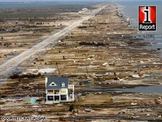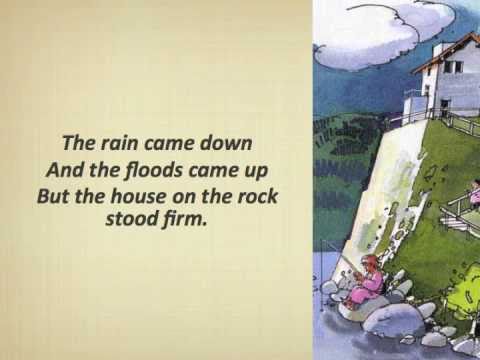
A few years ago, the state highway department replaced a bridge near our house. Who knew how often we drove across that bridge on a daily basis? It was the most direct route to town, to work, and school, and also went right past my parents' house. A detour was provided, but certainly was not the preferred route. My mother often complained during this construction time that we rarely saw each other any more. It was because the detour didn't allow us to easily go to their place even though we were less than 1 mile apart. We had to back track and make the effort or they had to go the long way around to get to us, and apparently we often fell short. Bridges are significant infrastructures. They connect us to others and the services we need. They make our lives more convenient and surprisingly, more meaningful. Sometimes we fail to appreciate those bridges until they are unavailable. When confronted with those large orange detour signs that warn us "ROAD CLOSED AHEAD - BRIDGE OUT" - we realize reaching our destination just got a little more difficult, and we might not be the only ones who feel cut off.
One of my passions in education is moving from knowing and doing. With this in mind, it is important to remember that the very nature of bridges helps us connect, getting us from point A to point B, whether it's through travel, learning, or taking us from knowing to doing. Examining and creating connections to real life or things that are familiar, makes learning meaningful. Personal connections make everything we do more fulfilling as we feel a part of the larger group where we can receive support while working toward common goals.
Personal connections are indeed bridges to understanding. My favorite teacher in middle school and high school was certainly knowledgeable in his field (English) but it was the relationships he built with his students that built the bridges that helped us understand and feel connected. We cared about what he wanted to teach us because he cared about us. He made it a point to know us and make us feel that what we thought and did mattered. When we were seniors, we dedicated our yearbook to him. Simon and Garfunkel's, "Bridge Over Troubled Waters" had been a big hit during my high school days (yes, that makes me old) and we used that theme to honor this man and the influence he had on us. I often use the following quote from Teddy Roosevelt in my workshops and with my students, "People don't care what you know until they know that you care." Caring is the first step in building bridges. This is a valuable lesson we must take with us everyday as we go to work or school, work within the community, and especially when we are with family and friends. Taking the time to build those bridges is truly worth it in terms of how it makes us feel, others feel, and how effective we can be.
New situations would be made easier if we worked harder at building bridges. When we enter a room with unfamiliar people, making those personal connections during introductions helps us remember their name and immediately builds a bridge. Extend that to the work place or a group that you are set to lead. As the new "boss," the first priority should be building bridges, relationships if you will, with the staff/employees/members. It is imperative to take the time to woo their hearts so you both believe they matter, both as people and as workers or members, much like we woo the affections of a potential mate. Those team building activities at the beginning of meetings or class may seem like fluff, but they are important to building those relationships that will make a difference in how well the organization will run. You may have big dreams and high expectations for those you oversee, but to paraphrase Roosevelt, until they know you care, they won't care what you know or what you want them to do. We have great power at our finger tips if we realize that everything we do and everything we don't do matters.
New employees or members would also benefit from our efforts to build bridges so that their experience as a part of our team is beneficial to both them and us. They will learn the required processes more quickly if we have established mentoring relationships and a framework to provide information and support so that their transition to this new role will allow them the opportunity to be successful.
Answering "Why" questions helps build bridges to understanding the need for change. It helps make the "how" and the "what" more meaningful by defining the purpose more clearly. Taking the time to address the "why" questions - proactively if possible - builds bridges by recognizing the individual needs, questions, and concerns of those involved. Leaders, including parents, often start with the 'what" or the "how" and only address the "why" if asked. Again, everyone needs to feel like they are being heard - that what they think and feel matters. As a result our responses to those questions that are voiced matter too. And FYI, despite what you may have heard, "Because I said so" isn't an effective bridge-building response either.
Then there are those times we must rebuild bridges that have been damaged or destroyed by our own words or actions. The Marshall Plan was enacted to rebuild war-torn Europe after World War II. One of the first things that was addressed was to rebuild the infrastructure (roads and bridges) to connect people and reduce their isolation. These were the very bridges that we had bombed just a few months or years earlier and now we were set to help rebuild them. We have all had moments where we have said or done things we wished we could take back, but the damage was done. How we respond will determine if the relationship remains strained or ruined, or if we can find ways to re-connect. We can't undo the damage but we can go forward and rebuild. As our babysitter used to tell our kids, "Sorry doesn't fix it, but you can change that behavior." A few years ago, I reconnected with my childhood best friend, after years of estrangement over some stuff that happened in college (pretty silly as I look back), because she reached out to build a bridge across our strained relationship. I am thankful every day that she took that chance and that I was able to respond in kind so that we could rebuild that friendship. That new bridge is priceless.
What bridge will you build today? How will you be a better friend? How will you be a better leader? How will you make a difference in the lives of others? As you find a way to make someone feel like they matter, remember YOU matter too!




 RSS Feed
RSS Feed